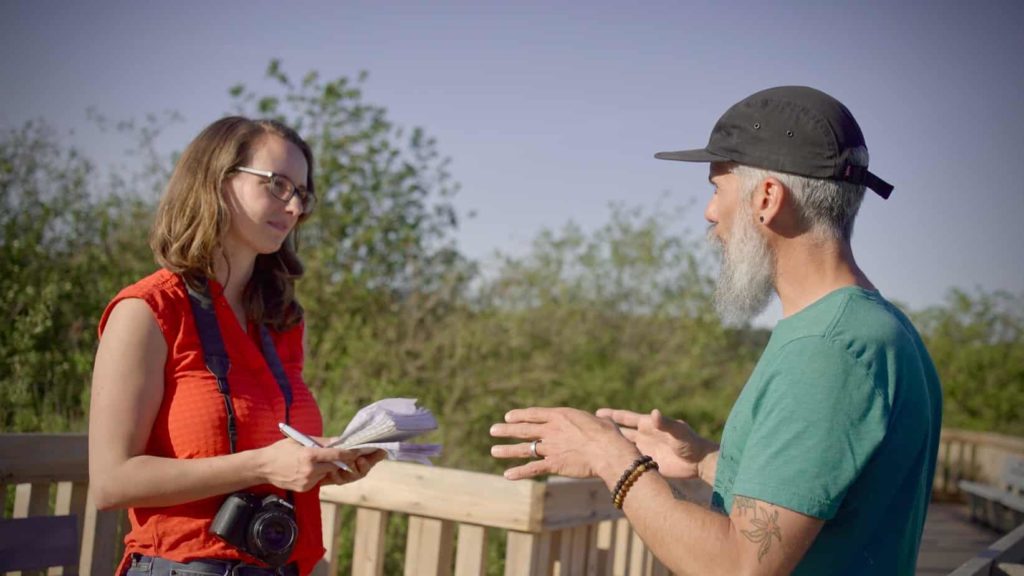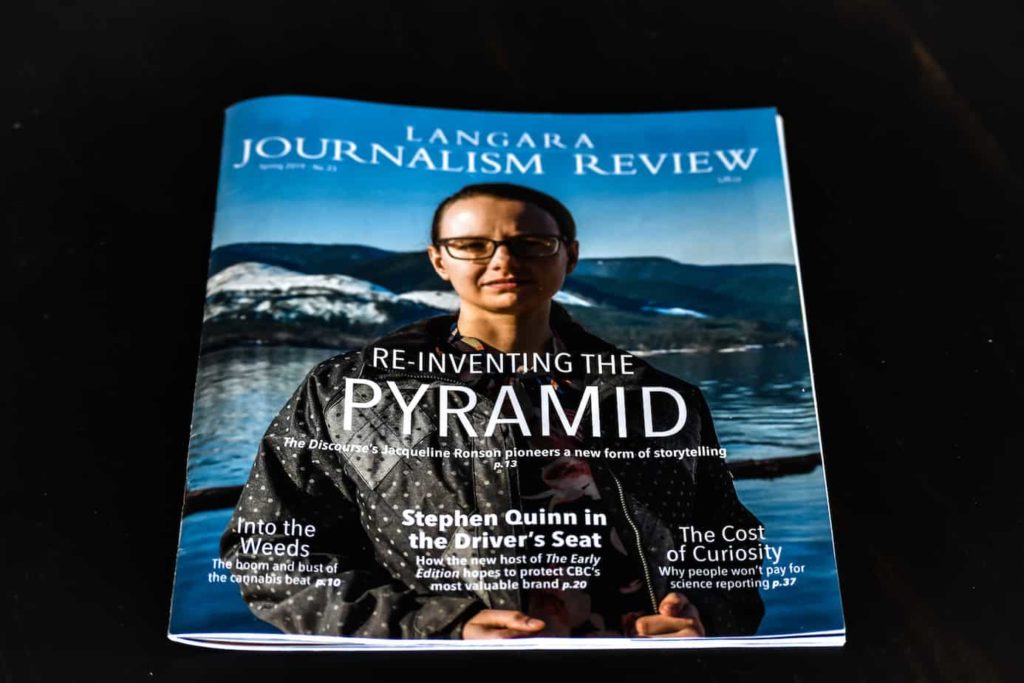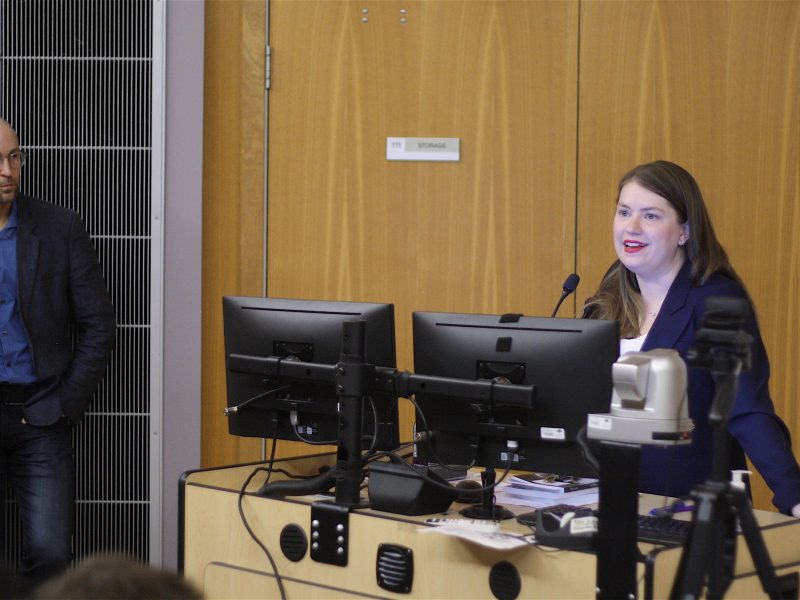
This is from our weekly Discourse newsletter. Make sure to share it and subscribe here.
When reporter Jacqueline Ronson first started working for The Discourse, she wanted to report on the environment from her home base of Youbou on Cowichan Lake. But the community steered her in a different direction.
After applying The Discourse’s model of listening deeply to what matters most to the community members we’re here to serve, she found herself investigating a story she never would have chosen herself: controversy over a local racetrack.
The resulting story (published last year) revealed how the local newspaper owned by Black Press stopped covering a dispute between local residents and business interests after advertising disappeared from the papers pages. We don’t know for sure whether the slowdown of coverage was the result of pulled advertising, but this series of events eroded residents’ trust in local media. Jacqueline’s coverage, on the contrary, helped residents feel heard. (Black Press’ coverage resumed and a lawsuit between residents and the racetrack was settled after The Discourse’s coverage.)
Jacqueline’s investigative reporting took months. This kind of journalism is expensive to produce. And that’s part of the reason it’s rare in most local communities. As local newspapers decline, cash-strapped newsrooms struggle to find the time and people-power to dig into investigations. According to the Public Policy Forum’s 2018 report “Mind the Gaps,” even in communities where the local newspaper has survived, the depth of civic reporting has diminished significantly.
Jacqueline’s work innovating a new model for providing in-depth journalism in the Cowichan Valley earned her cover girl (woman?) status in the Langara Review of Journalism this week.

Since publishing her groundbreaking investigation last summer, Jacqueline has been serving the Cowichan Valley with a weekly newsletter and ongoing investigative stories. “[The Discourse] seems like one of the few bright spots in the Canadian journalism industry right now,” Jacqueline told Review reporter Cameron Thomson. “There’s hope and excitement and commitment to really looking at our ethics and our values, and sticking to those values.”
For Jacqueline, engaging her community deepens her reporting. “You’re including your community in the conversation, and allowing them to tell you things they know, and that you don’t know.” Read the whole Langara Review of Journalism story about local investigative reporting here.
Investigative journalism holds power to account and helps citizens tackle challenges together — and those challenges are not only found in a handful of big cities. Small towns need in-depth journalism, too.
In the past few weeks, this newsletter has focused on journalism’s diversity problem and potential solutions. Geographic diversity matters, too. If you accept that journalism is good for democracy, then it’s crucial that the news industry develop new approaches. Journalism is part of the connective tissue that unites us as communities and connects us to civic life, not only for affluent audiences who live in a handful of urban centres, but for everyone.
So, as I asked last week, what is it going to take to see more equitable journalism? It’s going to take innovative journalists like Jacqueline to find the support they need to grow new approaches from the ground up and provide in-depth journalism to people overlooked by other media.
The question that remains for me is: will journalists who represent a different way figure out the business model to deliver that journalism sustainably? More on that soon.
This newsletter is taking a break next week for the May long weekend. Shortly after that, we’ll dig deep into the question of sustainability — and I’ll be asking you to be part of it.
Let’s gather
- May 17: Reporter Brielle Morgan is presenting Spotlight: Child Welfare, a collaborative data journalism project she leads, at the Collaborative Journalism Summit in Philadelphia. Follow along here.
- May 23: Cowichan Launch Party! Come support The Discourse and celebrate Jacqueline’s work at the Red Arrow Brewery. Event details here.
- June 4: The Discourse will be a featured company at an event on advancing gender justice through new investing practices hosted by Marigold Capital during Women Deliver.
- June 5: Save the date! The Discourse is hosting a party to mark its fifth birthday and celebrate women using media to build a more equitable world during Women Deliver in Vancouver.
- June 12-14: Director of communities Anita Li will be talking about the future of higher education and media in a post-truth world at the Worldviews Conference at the University of Toronto.
- June 16: Founder Erin Millar is presenting a keynote on changing media landscape at the Evolving Expectations, the Canadian Public Relations Society National Conference in Edmonton.
Shout outs
Last week this newsletter asked whether the New York Times stories that brought the #MeToo movement to the mainstream would have been published earlier if women had more power in newsrooms.
Thanks to our community members who weighed in:
Though I take your larger point about women’s influence about what gets published, it is also true that other men had tried to report on the Weinstein story but couldn’t for lack of evidence. Your paragraph below makes it look like only women (and Ronan Farrow) would do it. Men had been working on it for a number of years. Though I understand this is a complex issue involving the patriarchy and power dynamics, I also think we do a disservice to men if we don’t include the whole story. This is what leads to men believing that feminists hate men and the division and rancour that results. … I’m concerned that if we don’t acknowledge all the efforts that men have made we will continue to alienate some of them. If we want to achieve gender equality we need men as well and not crediting them hurts that process.
— Susan Wellisch
It felt a bit misleading to read “they ignited the Me Too movement.” That movement and phrase was the work of Tarana Burke. People started using it more broadly after the Kantor and Twohey’s work. Burke is often overlooked when it comes to talking about the movement (everyone from Kantor to Twohey, to Alyssa Milano being cited as “starting” it), which I’m sure is a product of underrepresentation, to your article’s point 🙂
— Kaitlin Pianosi
I would like to read your argument, but the headline was a non-starter for me. The ‘violence’ embedded in the headline/question, represents everything that I thought your mission sought to change about Canada’s Journalism. That is, say, something like, “discourse” over the use of such “power moves”.
— Michael Davis-Burchat
Frequent contributor Trish MacNeil shared a great resource: Informed Opinions, which tracks the gender gap in Canadian media sources. She writes:
In both my undergrad and masters, we looked at institutions, organizational structure and culture, and change. The conclusions drawn were that women (and children) are disproportionately impacted by reductions in social programs, tax reforms favouring the most wealthy and women pick up the most slack in the unpaid labour force aka why social program cuts impact them more. Then you add the default definition being a great employee is defined by being white male — anyone that is not a white male cannot emulate confidence or will be perceived as aggressive or uppity. However, then women are not promoted because they are not showing enough leadership. This dynamic would heavily impact journalistic opportunities. Therefore change without addressing the core problems is a facade.
— Trish MacNeil
Tell us: What will it take to achieve equitable representation in mainstream and startup media? [end]
Thanks to community members like you, we’ve been able to grow our team to address gaps in media coverage. Like what you’re reading? Please forward to friend or two, and encourage them to subscribe.



